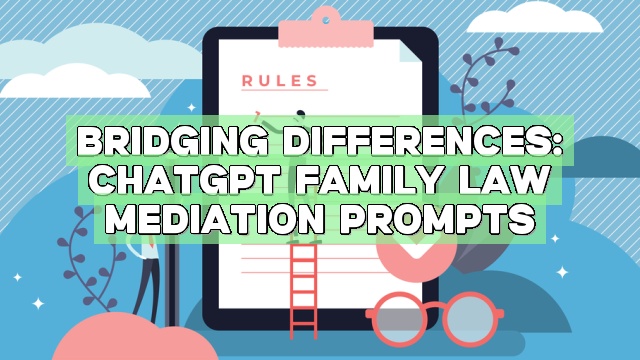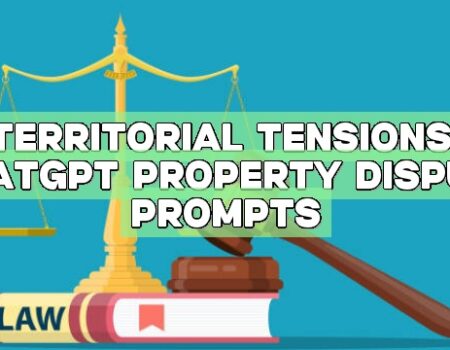Family law disputes are never easy. Emotions run high, and it can be challenging to find a peaceful solution that satisfies all parties involved. However, there is a promising new tool that can help make the process more manageable and less stressful: ChatGPT prompts for family law mediation.
ChatGPT is an AI-powered tool that generates prompts to guide conversations towards productive outcomes. Using this technology, family law mediation can become a less daunting task, as it allows for a smoother and more straightforward process. With ChatGPT prompts, family law mediation can help to bridge differences and settle disputes peacefully.
Key Takeaways:
- ChatGPT prompts offer a promising new tool to simplify the family law mediation process.
- With the help of AI technology, ChatGPT can guide conversations towards peaceful outcomes.
- Family law disputes can be challenging, but ChatGPT prompts offer a pathway to bridging differences and finding common ground.
Understanding Family Law Mediation
Family law mediation is an alternative dispute resolution process that aims to help people resolve their conflicts outside of the courtroom. This process involves an impartial third-party mediator who helps facilitate communication and negotiation between the parties involved.
The mediator does not make decisions for the parties but rather assists them in reaching a mutually beneficial agreement. Family law mediation can be used for a variety of issues, including divorce, child custody, visitation schedules, and property division.
Introduction to ChatGPT and its Role in Mediation
ChatGPT is an innovative artificial intelligence (AI) tool that has transformed the family law mediation process. With its advanced algorithms, ChatGPT prompts can generate responses tailored to specific situations, facilitating productive conversations and providing effective solutions to help families resolve disputes.
As a mediation tool, ChatGPT is an invaluable asset for both professional mediators and individuals seeking to resolve conflicts amongst their families. It offers a unique approach that is cost-effective, fast, and efficient compared to traditional mediation methods.
The Power of Prompts in Mediation
Effective communication is vital in family law mediation, and prompts can help guide the conversation towards productive outcomes. ChatGPT prompts offer an innovative solution for mediation, as they can assist in clarifying the issues, identifying common ground and finding possible solutions to the dispute.
ChatGPT prompts are designed to ask open-ended questions that encourage users to think deeply and express themselves in a clear and concise manner. These prompts can help parties to understand each other’s perspectives and goals, ultimately facilitating the development of mutually acceptable solutions.
Moreover, ChatGPT prompts are not designed to replace human communication, but to assist in the process. They can be used as a starting point for discussion, or as a tool for clarifying and exploring issues in greater depth. ChatGPT prompts can also assist in defusing emotionally charged situations by extracting facts and feelings from both sides objectively, enabling a more productive conversation.
Example Prompts for Family Law Mediation
Here are some example ChatGPT prompts that have proven effective in family law mediation:
| ChatGPT Prompt | Explanation |
|---|---|
| “Can you tell me more about how this situation is affecting you emotionally?” | This prompt encourages the parties to express their emotional needs and concerns, which can lead to more empathetic and understanding discussions. |
| “What are your top priorities in this case?” | This prompt helps the parties identify their essential needs and desires, which can inform the development of a mutually beneficial agreement. |
| “How would you suggest we move forward from this point?” | This prompt allows the parties to take ownership of the resolution process and propose solutions that align with their interests and values. |
These prompts are designed to be open-ended and non-confrontational, creating a safe and collaborative environment for mediation. By using these prompts, ChatGPT can guide the conversation towards a peaceful and satisfactory resolution for all parties involved.
Employing ChatGPT for Complex Mediation Tasks
ChatGPT is an AI-powered tool that can assist with even the most complex family law mediation tasks. When dealing with complex disputes, it may be necessary to provide more background information to the tool to generate prompts that are well-suited to the situation at hand.
Longer prompts can be utilized to provide more context and generate responses that are more in line with the parties’ needs. Additionally, users can employ prompts that gradually lead to the desired outcome, helping to guide the conversation towards a successful resolution.
Strategies for Achieving Desired Outcomes
When dealing with complex mediation tasks, the following strategies can help users achieve their desired outcomes:
| Strategy | Description |
|---|---|
| Provide Adequate Context | Users should provide as much relevant information as possible to ChatGPT to ensure it generates appropriate prompts. By doing so, the tool can help guide the conversation towards a successful resolution. |
| Employ Gradual Prompts | Gradual prompts can help guide the conversation towards the desired outcome by breaking down complex issues into smaller, more manageable parts. This strategy can be especially effective when dealing with parties who may be resistant to mediation or compromise. |
| Be Open to Change | Users must be open to exploring new solutions or approaches to a dispute. ChatGPT can generate prompts that challenge the parties’ assumptions and encourage creative thinking, leading to more innovative and effective solutions. |
By utilizing these strategies, users can employ ChatGPT to tackle even the most complex family law mediation tasks, leading to successful and satisfactory outcomes.
ChatGPT as a Mediation Tool: Case Studies
To fully understand the impact of ChatGPT as a mediation tool, it’s essential to examine real-life examples of its successful implementation. In this section, we explore a few case studies that demonstrate the effectiveness of ChatGPT prompts in family law mediation.
Case Study 1: Divorce Mediation
A couple undergoing a divorce was struggling to reach an agreement on child custody and asset allocation. The mediator introduced ChatGPT prompts as a tool to guide their conversation towards a peaceful resolution.
The couple found the prompts helpful in encouraging them to consider each other’s perspective and come up with mutually beneficial solutions. ChatGPT prompts helped them remain calm and focused on the goal of finding a resolution, and ultimately, they were able to reach an agreement that satisfied both parties.
Case Study 2: Inheritance Dispute
Two siblings were in the midst of a dispute over the distribution of their father’s estate. The mediator suggested using ChatGPT prompts to help them discuss the complicated legal issues and come to a resolution that honored their father’s wishes.
The siblings found ChatGPT prompts very useful in breaking down complex legal terms and understanding the legal implications of their decision. The prompts helped them focus on the fundamental question of how their father’s estate should be divided and allowed them to consider the emotional aspects of the dispute. The chatbot helped them arrive at a fair distribution of their father’s assets, and the siblings were able to mend their relationship.
Case Study 3: Child Custody Mediation
A newly separated couple was struggling to agree on a custody arrangement for their child. After reaching an impasse, they decided to seek the help of a mediator, who introduced ChatGPT prompts to come up with a creative solution.
The prompts helped the couple explore their options in a peaceful and respectful manner. They were able to come up with a solution that took into account their child’s best interests and allowed both parents to maintain a meaningful relationship with their child. ChatGPT’s ability to provide a neutral perspective allowed the couple to find common ground and reach an agreement that was fair and equitable.
These case studies showcase the transformative power of ChatGPT as a mediation tool. By guiding conversation towards peaceful resolutions, ChatGPT prompts help users to consider alternative solutions and come to mutually beneficial agreements. The case studies also demonstrate the importance of having a skilled mediator who can employ ChatGPT prompts effectively, ensuring successful outcomes.
Overcoming Challenges with ChatGPT Mediation
While family law mediation can be a difficult process, adding ChatGPT prompts can present its own set of unique challenges. One major issue is the potential for misinterpretation. The prompts generated by the AI model may be misunderstood by one or both parties, leading to confusion and setbacks in the mediation process.
Another challenge that may arise is the limitation of the AI model. While ChatGPT is an excellent tool for generating prompts and helping to navigate the conversation, it is not a substitute for a human mediator. There may be situations where ChatGPT cannot provide effective prompts, or where a human mediator is needed to provide additional support and guidance.
Finally, there is the issue of data privacy and confidentiality. As with any technology that involves collecting and storing data, there is a risk of data breaches or unauthorized access. It is important to take precautions to ensure that all data collected through ChatGPT is kept secure and confidential.
Despite these challenges, there are strategies that can be employed to ensure successful mediation with ChatGPT prompts. First and foremost, it is important to establish clear communication and understanding between all parties involved. This can be achieved by reviewing and discussing the prompts generated by ChatGPT before the mediation session takes place.
Another effective strategy is to use a combination of prompts generated by ChatGPT and prompts developed by a human mediator. This can help to bridge any gaps in communication and ensure that all parties feel heard and understood.
Finally, it is crucial to prioritize data privacy and confidentiality throughout the mediation process. This can be achieved by using secure platforms for communication and data storage, encrypting sensitive information, and obtaining consent from all parties before collecting any data.
In conclusion, while there are challenges associated with using ChatGPT prompts for family law mediation, these can be overcome by implementing effective strategies and prioritizing clear communication and data privacy. By doing so, ChatGPT can be an invaluable tool for facilitating peaceful and successful resolutions within families.
Tips for Successful Mediation with ChatGPT
Using ChatGPT prompts for family law mediation can be highly effective, but achieving successful outcomes requires careful consideration and preparation. Here are some tips to help you make the most out of this transformative tool:
- Be clear and concise: When crafting prompts, make sure they are unambiguous and straightforward. Avoid using complex language or legal jargon that may confuse or intimidate the parties involved.
- Be empathetic: Remember that mediation is about finding mutually agreeable solutions that benefit all parties. Try to put yourself in their shoes and understand their perspectives and concerns.
- Be patient: Resolving disputes takes time, and it may take several rounds of prompts to reach a satisfactory outcome. Avoid rushing the process or imposing your own solutions.
- Be neutral: As a mediator, it is essential to remain impartial and avoid taking sides. Ensure that your prompts are neutral and do not show any bias towards any party.
- Be innovative: Experiment with different prompts and approaches to find what works best for each case. Don’t be afraid to think outside the box and try new strategies.
- Be prepared: Familiarize yourself with the case and the parties involved before beginning the mediation process. This will help you tailor your prompts and facilitate productive discussions.
- Be flexible: Mediation is a fluid process, and it may require adjustments along the way. Be prepared to modify your prompts or approach if necessary to ensure a successful outcome.
By following these tips, you can maximize the potential of ChatGPT prompts and achieve peaceful resolutions that benefit all parties involved.
Ethical Considerations and Data Privacy
The use of ChatGPT prompts in family law mediation raises important ethical considerations and concerns around data privacy. As an AI-powered tool, ChatGPT utilizes personal information and data to generate effective prompts and responses, making it critical to maintain confidentiality and ethical usage.
It is essential to ensure that all parties involved in the mediation process provide explicit consent to the use of ChatGPT and understand how their data will be utilized. Additionally, mediators should handle sensitive information with care and implement appropriate security measures to protect personal and confidential information.
Mediators should also consider the potential biases and ethical implications of using AI in the mediation process. It is crucial to remain impartial and ensure that ChatGPT is not utilized to mask or perpetuate biases.
By adhering to ethical and privacy considerations, ChatGPT can be used as a transformative tool for peaceful resolutions in family law mediation.
Conclusion: A Transformative Tool for Peaceful Resolutions
In conclusion, ChatGPT prompts have revolutionized the family law mediation process by providing a transformative tool for peaceful resolutions. With the assistance of AI technology, the mediation process has become simplified, allowing for greater ease and accuracy in finding solutions. Furthermore, the use of prompts has been shown to guide conversations towards productive outcomes, giving individuals the opportunity to express their needs and concerns in a supportive environment.
Employing ChatGPT for complex mediation tasks has proven to be particularly effective, as longer prompts and background information can be used to achieve desired outcomes. Real-life case studies have demonstrated ChatGPT’s ability to facilitate successful resolution of disputes, even in challenging circumstances.
While there may be challenges associated with using ChatGPT for family law mediation, strategies for overcoming these challenges effectively have been provided. Moreover, valuable tips and best practices have been offered to maximize the effectiveness of ChatGPT prompts in family law mediation, ensuring a successful and satisfactory outcome.
It is important to consider ethical considerations and data privacy concerns when using ChatGPT for family law mediation. Maintaining confidentiality and ensuring ethical usage are essential in promoting trust and confidence in the mediation process.
Overall, ChatGPT prompts have transformed the family law mediation process by providing a supportive and productive environment for peaceful resolutions. Its incorporation of AI technology has allowed for simplicity and accuracy, and its use of prompts has guided conversations towards productive outcomes. By employing the tips and strategies provided, ChatGPT can be an effective tool in achieving satisfactory resolutions for all parties involved.
FAQ
Q: What is family law mediation?
A: Family law mediation is a process of resolving disputes within families, such as divorce, child custody, or property division, through the assistance of a neutral third party mediator.
Q: How does ChatGPT assist in family law mediation?
A: ChatGPT is an AI-powered tool that can provide prompts and suggestions during family law mediation, helping guide the conversation towards productive outcomes and peaceful resolutions.
Q: What are the benefits of using ChatGPT prompts in mediation?
A: ChatGPT prompts in mediation can help facilitate more effective communication, generate useful responses, and provide an unbiased perspective, ultimately leading to better outcomes.
Q: Can ChatGPT be used for complex mediation tasks?
A: Yes, ChatGPT can be employed for complex mediation tasks. By using longer prompts and providing background information, users can leverage ChatGPT’s capabilities to handle intricate situations and achieve desired results.
Q: Are there any case studies showcasing the use of ChatGPT as a mediation tool?
A: Yes, real-life case studies demonstrate successful resolutions achieved through using ChatGPT as a mediation tool. These case studies highlight the challenges faced and the positive outcomes obtained.
Q: What are some tips for successful mediation with ChatGPT prompts?
A: To maximize the effectiveness of ChatGPT prompts in family law mediation, it is recommended to carefully choose prompts, provide clear instructions, and maintain an open and collaborative mindset throughout the process.
Q: What ethical considerations and data privacy concerns should be addressed when using ChatGPT?
A: When using ChatGPT, it is important to ensure confidentiality, protect sensitive information, and adhere to ethical guidelines. Users should be mindful of data privacy and take necessary precautions to safeguard all parties involved.









